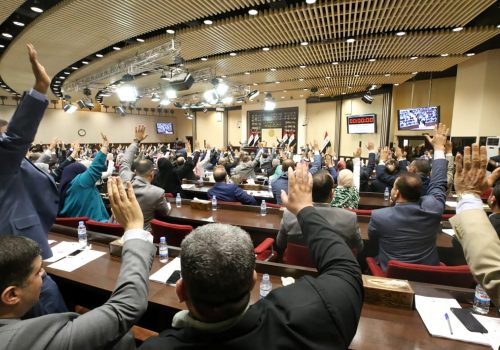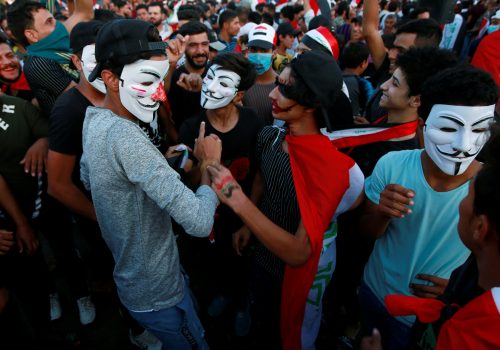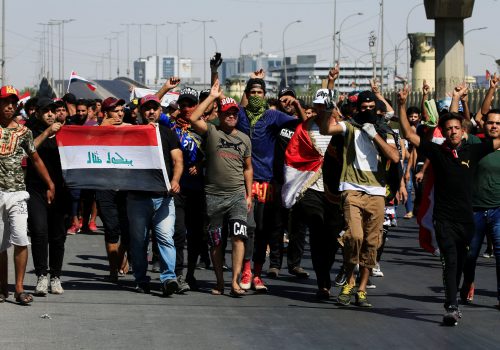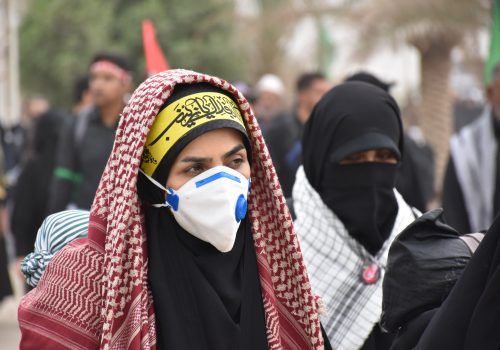Will protests herald a new era in Iraqi politics?
The defining feature of the protests in Baghdad which started on October 1 and spread to other cities in southern Iraq is that they were neither led nor called for by a religious authority (also known as the marja’iya) or another leader. When the first wave of protests began in multiple cities, the protesters’ message was clear: they did not accept any religious or political leadership over their movement. The spontaneous actions of ordinary people who are not driven by sectarian mindsets and are occupying the streets of Baghdad, Nasiriyah, Diwaniyah, Karbala, and other cities sent a pointed message to the politicians and ruling elites that street politics will be used to try to trigger a change.
Corruption is the primary grievance
The first wave of protests in early October might have been provoked by the removal of a popular general from his post. However, the root causes go much deeper. In reality, people are protesting against the lack of basic services like electricity, clean water, good roads, health care, unemployment benefits and, above all, the corrupt political elite. The perseverance of protesters, even in the face of violence, underscores the resentment of Iraq’s youth towards this elite and its botched and divisive politics.
Corruption is what has really driven people to take to the streets. Institutionalized corruption is rampant in the country; it does not just occur in individual cases. This pervasive corruption has devoured the country’s resources and amounts to around $320 billion stolen since the birth of the new Iraqi state in 2003. The majority of this money has been taken by ministries and civil services that are dominated by powerful political parties. Phantom projects and contracts are a cover to divert the funds into individual pockets and spread patronage.
Knowing this is how their political institutions are run, protesters have every reason to believe that in this kleptocratic state, a revolution is necessary to bring change to the system. This belief also drove the recent protests in Lebanon, which have resulted in the resignation of the Lebanese prime minister.
In Iraq, protesters’ demands first focused on jobs, public services, and a decent standard of living, but later turned to the overthrow of the government. The renewal of the protests on October 25 after a short hiatus confirms the people’s demand for change. The burning down of political party headquarters in many cities represents the population’s disillusionment with and anger towards these parties, which control the government and are deeply immersed in corruption.
The corruption in Iraq is perpetuated by the powerful political parties which have their own armed forces and access to the national budget. They control the government and act as a state within a state. This has led to the emergence of the phenomenon of the deep state for the first time in Iraq. The deep state that exists in Iraq is the religious and political authorities that exert influence on the political process, but are not necessarily part of the government. One example of this phenomenon is the Popular Mobilization Forces (PMF), a collection of militias which gained influence as a result of fighting against the Islamic State (ISIS). They have been financed and armed by the Iraqi national budget and some are supported by Iran.
The stratum of Iraqi society that has suffered most is the youth, many of whom are now involved in the current protests. They know very well that their country sits on the fifth largest oil reserves and had a budget of $111.8 billion this year. Nevertheless, in 2018 around 16.5 percent of the country’s youth was unemployed and around 22.5 percent of the population was living in poverty in 2014.
What the future holds
Interestingly, the Iraqi national security advisor and head of the PMF, Faleh al-Fayyadh, has expressed the PMF’s support for the Iraqi government and has implicitly denounced the protesters, a move that could be seen as protecting the Prime Minister Adil Abdul-Mahdi’s government from falling apart. Meanwhile, protesters have blamed the security services and militias for the deaths of more than 250 protesters and thousands wounded since the demonstrations’ start in early October.
This alludes to an inter-Shia rift as the influential cleric Muqtada al-Sadr has called on the government to resign and has expressed his support for the protests. He first refrained from calling for his supporters to join the protesters because of the demonstrators’ rejection of any external leadership over their uprising. However, when Ayatollah Sistani—whose intervention is crucial as the highest religious authority in the country—warned the government to meet the protesters’ demands, al-Sadr followed suit and called on his supporters to join the demonstrations that began on October 25.
The current government’s and parliament’s response to the demands of the protesters has focused on reshuffling posts and promising jobs for the unemployed youth. This move would further burden the already inflated public sector employment as about 75 percent of the state budget goes to payroll for government employees and buying political loyalty. Successive governments since 2003 have never made it their priority to address this institutionalized corruption and nepotism.
The very foundation of the new post-Ba’ath Iraqi state is based on the muhasasa or apportionment system. This system should be a way to give equal recognition to all ethnicities/nationalities, religions, languages, and cultures to ensure the inclusion of all groups in a federal framework. However, this system has never been successful in Iraq and has instead perpetuated sectarian politics.
Now, especially after the territorial defeat of ISIS, ordinary people in Shia-majority cities will no longer be deterred by the politics of fear. In the past, leaders used the politics of fear to promote existential sectarian threats to create societal schisms. The July 2018 protests in Basra were an initial blow to the Iraqi politicians and war lords who attempted to harness the politics of fear to their advantage. People in the Shia heartland—the oil-rich city of Basra—protested last year about the lack of public services such as clean water and demanded a decent living standard.
The ongoing protests in Baghdad and other cities are a reaffirmation of these longstanding demands. They are demands for a better life that is not based on cronyism. They are also a call for a political system that is based on the democratic inclusion of all the country’s components and an end to the kleptocracy that plunders Iraq’s revenues for the benefit of the elite and leaves the rest of the people to live below the poverty line.
The deadly force used against the protesters seems to be a desperate attempt by the ruling political elites to bring the protests to an end. However, even if they are successful in doing so, the political and economic situation in Iraq is a pressure cooker that could explode at any time. Having said that, even with the promised resignation of Abdul-Mahdi’s government which can be seen as a win for the protesters, it is important that these protests eventually become a social movement that is focused on changing the system and not merely the government.
Dr. Dara Salam is a Teaching Fellow in the Department of Politics and International Studies at SOAS University of London. Follow him @Dara_Salam
Further Reading
Image: Iraqi demonstrators attend an anti-government protest in Baghdad, Iraq October 31, 2019. REUTERS/Thaier Al-Sudani



